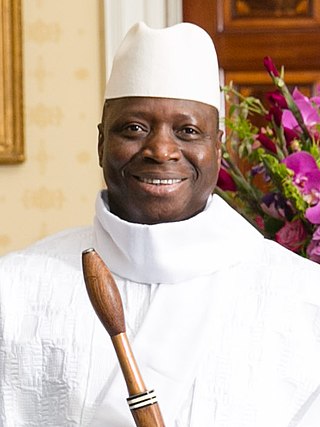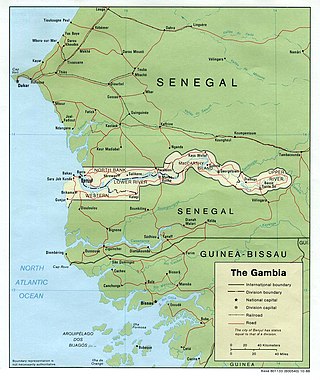Related Research Articles

The Gambia, officially the Republic of The Gambia, is a country in West Africa. Geographically, The Gambia is the smallest country in continental Africa; it is surrounded by Senegal on all sides except for the western part, which is bordered by the Atlantic Ocean.

Politics of The Gambia takes place within the framework of a presidential republic, whereby the President of The Gambia is both head of state and head of government, and of a multi-party system. Executive power is exercised by the government. Legislative power is vested in both the government and parliaments.
Telecommunications in the Gambia includes radio, television, fixed and mobile telephones, and the Internet.

The first written records of the region come from Arab traders in the 9th and 10th centuries. In medieval times, the region was dominated by the Trans-Saharan trade and was ruled by the Mali Empire. In the 16th century, the region came to be ruled by the Songhai Empire. The first Europeans to visit the Gambia River were the Portuguese in the 15th century, in 1447, who attempted to settle on the river banks, but no settlement of significant size was established. Descendants of the Portuguese settlers remained until the 18th century. In the late 16th century, English merchants attempted to begin a trade with the Gambia, reporting that it was "a river of secret trade and riches concealed by the Portuguese."

Yahya Abdul-Aziz Jemus Junkung Jammeh is a Gambian politician and former military officer, who served as President of the Gambia from 1996 to 2017, as well as Chairman of the Armed Forces Provisional Ruling Council from 1994 to 1996.

The Gambia national football team represents the Gambia in men's international football and is controlled by the Gambia Football Federation. Until 1965, the team and the country were known as British Gambia. The team has never qualified for the World Cup. In 2021, Gambia qualified for the Africa Cup of Nations finals for the first time in history. The team represents both FIFA and Confederation of African Football (CAF).

Serekunda or Serrekunda is the largest urban centre in The Gambia. It is situated close to the Atlantic coast, on the Gambia River, near the capital, Banjul. Serekunda and Banjul form an urban area known as the Kombos, with about half of the population of the Gambia.

Lower River Division is one of the five administrative divisions of the Gambia. Its capital is Mansa Konko. The city and area council elections were held during April 2002, when Wally S.M. Sanneh, an APRC candidate became the Mayor, winning unopposed. The council was led by Alliance for Patriotic Reorientation and Construction (APRC), which won all the 12 seats.

Central River is the largest of the five administrative divisions of the Gambia. Its capital is Janjanbureh, on MacCarthy Island. The largest settlement is Bansang, with an estimated population in 2008 of 8,381.

North Bank was one of the five administrative divisions of the Gambia. Its capital was Kerewan. It was subsequently reorganised as the Kerewan Local Government Area (LGA), without any change in the area covered.

Upper River was one of the five Divisions of the Gambia. Its capital was Basse Santa Su. It was subsequently reorganised as the Basse Local Government Area, without any change in the area covered.

West Coast Region, originally the Western Division, also known as Foni or Fonyi, was one of the five administrative divisions of the Gambia. Its capital was Brikama. It was subsequently reorganised as the Brikama Local Government Area (LGA), without any change in the area covered.

The Gambia is divided into five administrative Regions and one City. The divisions of the Gambia are created by the Independent Electoral Commission in accordance to Article 192 of the National Constitution.
Football is the most popular sport in The Gambia and still growing in popularity.

Adama Barrow is a Gambian politician and real estate developer who has served as President of the Gambia since 2017.

Parliamentary elections were held in The Gambia on 9 April 2022 to elect members of the 58-seat National Assembly.
Local elections were held in The Gambia on 12 April 2018. The elections saw a victory for the United Democratic Party. Voter turnout was low, at 29 percent of eligible voters participating. Gambian citizens also criticized the slow release of election results.
Local elections were held in the Gambia on 20 May 2023. The elections took place following President Adama Barrow's re-election under the banner of the new National People's Party, and their subsequent victory in the 2022 parliamentary elections.
Local elections were held in the Gambia on 25 April 2002. The elections were the first to be under the 2002 local government act. The elections were boycotted by the primary opposition party, the United Democratic Party.

The 2022 Gambian coup attempt was a military coup d'état attempt which took place in The Gambia on 20 December 2022. Reportedly, some soldiers attempted to overthrow the government of President Adama Barrow. Four soldiers were arrested on suspicion of involvement. The Gambian military initially denied that any such coup attempt took place. It also went after three other alleged conspirators. The coup leader was later named as LCpl Sanna Fadera. The attempt was condemned by Economic Community of West African States (ECOWAS) and the main opposition party, the UDP.
References
- 1 2 "Gambians Vote in 2013 Local Government Elections". AllAfrica. 5 April 2013.
- ↑ "Local Govt. election slated for 4th April - The Point". thepoint.gm. Retrieved 2024-10-06.